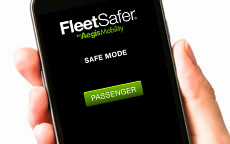
Why Be Concerned About Liability?
“Employers should be concerned, not only because of the potential for injury or death caused by texting while driving, but because they face potential employer liability if an employee causes a car accident while engaged in distracted driving on the job.”
—B. Anderson, Florida Car Accident Attorney
When can an employer become liable and for how much?
- Employers face potential liability if an employee causes a car accident when engaged in distracted driving on the job
- Employers can be held liable if the driver was using:
- An employer-owned cell phone
- An employer-owned vehicle
- A personal car, but was acting within the scope of their employment
- A personal phone, but was having a work-related phone conversation
- Employers can be held accountable even when the organization has a safety policy following federal regulation and state laws. For example, employers face liability when:
- A written policy banning cell-phone use while driving exists, but the policy is routinely violated and the company ignores these violations
- An employee is engaged in activites that benefit the employer, while using a non-work phone and in a non-work vehicle, outside of work hours
- Employers found liable can potentially be ordered to pay millions in awards
- 2012, $21 million in damages awarded, where an employee used a hands-free device and crashed
- 2008, $24.7 million in damages, where an employee reached for his cell phone and crashed
- 2007, $ 21.6 million in damages, where an employee talked on a personal phone while driving a company car
- Employers reduce risk by establishing safe-driving policies and enforcing those policies
References
Anderson, B. (2012) Florida Car Accident Attorney Encourages Employers to Adopt Distracted Driving Policies. Retrieved from http://www.prweb.com/releases/prwebflorida-injury-attorney/distracted-driving-crash/prweb9903573.htm
Anders, M. (2012) Report: Distracted Driving costs employers millions in liability cases. Retrieved from http://www.mlive.com/news/index.ssf/2012/04/report_distracted_driving_cost.html
National Safety Council (2012). Employer Liability and the Case for Comprehensive Cell Phone Policies. Retrieved from http://www.nsc.org/safety_road/Distracted_Driving/Documents/CorpLiability_wp.pdf
Montlick & Associates (2011). Many Fortune 500 Companies Banning Cell Phone Use to Avoid Auto Accident Liability. Retrieved from http://www.montlick.com/montlick-blog/montlick-law-blog/327-many-fortune-500-companies-banning-cell-phone-use-to-avoid-auto-accident-liability
O'Rourke, M. (2012) Coca-Cola Hit with a $21 Million Distracted Driving Judgement. Risk Management Monitor. Retrieved from http://www.riskmanagementmonitor.com/coca-cola-hit-with-a-21-million-distracted-driving-judgement/
Holbrook, E. (2010) Distracted Driving on Company Time... A Risk Manager's Worst Nightmare. Risk Management Monitor. Retrieved from http://www.riskmanagementmonitor.com/distracted-driving-on-company-time/
Enforcing a Distracted Driving Policy Reduces Risk
"Employers who have policies do not automatically avoid liability, but they are much better positioned to make a case...as long as the policy is clearly communicated and consistently enforced."
—Susan W. Kline, Partner at Faegre Baker Daniels, Indianapolis
- Employers are responsible for making sure that policies are enforced
- Employers who clearly communicate and consistently enforce their distracted driving policies are in a much better position to make a case to reduce liability when a crash occurs
- Employers need to communcate to employees that ignoring company safety policies will lead to serious consequences
- Investigate technologies available to help you enforce your policies
References
Distracted Driving: Developing and Enforcing a Policy from a Business Perspective. (2012). Strategic Outcomes Practice You Should Know. Retrieved from http://www.willis.com/documents/publications/Services/Claims_Management/YSK_30_Distracted_Driving.pdf
Smith, R. (2012). Employer Liability Varies When Workers Using Cell Phones Cause Vehicle Crashes. Bloomberg BNA. Retrieved from http://www.bna.com/employer-liability-varies-n12884910098/
SIA Group Blog Home. Retrieved from http://siagroup.wordpress.com/2011/04/04/distracted-driving-employers-liability/


Will Having a Driving Policy Affect Productivity?
“When companies with bans were surveyed by the NSC two years ago, 7 percent said productivity had declined after the ban but 19 percent said it had increased. There was absolutely concern about that, but our position is, quite simply, that we don't make safety decisions based on productivity."
—Doug Pontsler, VP Safety for Owens Corning
Driving Policies and Productivity
- Productivity rarely decreases when a phone policy is put in place because:
- Employees find ways to maintain productivity and accessibility after they stop using the phone while driving
- Employees change their habits to improve efficiency, such as better time management
- According to an NSC survey of member companies, 70% saw no change in productivity or increased productivity after a cell-phone policy was put in place
- Traffic collisions increase costs and decrease productivity
- Employers are encouraged to make safety decisions based on risk to lives, rather than on impact to productivity
References
Drive Employees to a Company-Wide Traffic Safety Policy: No More Distracted Driving. (2012). National Safety Council. Retrieved from http://www.nsc.org/safety_road/Employer%20Traffic%20Safety/Documents/Texas%20Distracted%20Driving/DistractedDriving_FAQ.pdf
Focus Driven: Advocates for Cell-Free Driving. Retrieved from http://www.focusdriven.org/faq
Halsey, Ashley. (2012). Employees use of cellphones while driving becomes a libility for companies. Washington Post. Retrieved from http://www.washingtonpost.com/local/trafficandcommuting/employees-use-of-cellphones-while-driving-becomes-a-liability-for-companies/2012/05/20/gIQAFia2dU_story.html
Should You Use Technology to Enforce Policies?
"Employers whose businesses require the use of cars, vans or trucks must understand that their policies and training regarding the safe operation of those vehicles...are of strong interest to OSHA, the law enforcement community, insurance carriers and potential civil litigants... Consider the use of certain applications in company-issued devices that can block the use of cell phones, including texting and internet access, while a vehicle is moving."
—MA Lies & M. Newman, "Addressing Distracted Driving"

Government Regulation and Links
Occupational Safety & Health Administration (OSHA)
Federal Motor Carrier Safety Administration (FMCSA)
Pipeline and Hazardous Materials Safety Administration (PHMSA)
- Final Rule: Limiting the Use of Electronic Devices by Highway
- Final Rule: Restricting the Use of Cellular Phones by Drivers of Commercial Motor Vehicles in Intrastate Commerce
